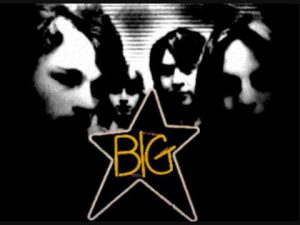
Finally caught the awesome Big Star documentary the other night, even though I was and remain a Replacements fan and have loved their song “Alex Chilton” for many moons; know some of the people involved with the Big Star reunions; and have been being yelled at by friends to watch the documentary for years. Sometimes I’m slow. It’s okay.
But it’s so good – most everything about Chilton and Memphis, but also the stuff about guitarist Chris Bell is just so weird.
By the mid-1960s, Memphis was teeming with teenage musicians captivated by their hometown’s role in birthing rock and roll, then the most dominant cultural expression of the era. Chilton had acquired no small amount of musical sophistication and talent just by virtue of parental osmosis. Well, that and he had a somewhat gimmicky ability to sing like soul-singers much darker and older than an upper-middle class white kid had any right to do. After a high school talent competition, Chilton was asked to join a local group of older musicians that eventually came to be called The Box Tops. Like Big Star, that name doesn’t mean much beyond music obsessives, but the band’s first single sold a few million copies and remains one of the most recognizable hits of the sixties. When “The Letter” hit number one, Chilton was just 16 years old.
The Box Tops churned out a number of minor hits after that, and Chilton, who had dropped out of school, went on tour with the band and partook in the usual rock and roll carousing. He partied with The Doors, and with The Box Tops’ brief career winding down, he even moved out to California to live with Brian and Dennis Wilson of the Beach Boys. (It was there that he once crashed on the same couch with Charles Manson.) With The Box Tops breaking up, he largely abandoned the pursuit of fame. He taught himself to play guitar, worked on writing his own songs, and moved to New York where he became a fixture on the Greenwich Village folk scene. Along the way he got married, had a child, and divorced not long after. After briefly connecting with Chris Bell, a visionary musician from his teenage days in Memphis, Chilton moved back home to join his band. Big Star recorded and released their first album, the ironically titled #1 Record.
All this happened by the time he was 21. At an age when most of us were still trying to decide what we were going to do with our lives, Chilton had lit the fuse on a bomb that’s still sending shockwaves through pop music. But by the time we get to Chilton’s involvement with Big Star, well, here’s where George-Warren’s book, with its exhaustive details and an impressive authorial command, departs from the traditional rock and roll narrative. (And I do mean exhaustive—the book’s opening chapter traces the Chilton family history back to 11th century Normandy. If you want to know which houseguest Chilton’s mother showed how to make homemade mayonnaise, well, it’s all in here.)
Here’s a heavily abbreviated version of what happened: After a too brief and brilliant career, Big Star simply collapsed. Despite some positive critical notices, they remained largely unknown for a decade afterwards. Big Star’s music was so undeniably good that, over time, critical consensus simply reached critical mass. The resurrection of Big Star in the 1980s was a heartening and surprising event that’s almost unique in rock history.
Anyway… Here’s to tangents, slowness, weird great music, friends.

